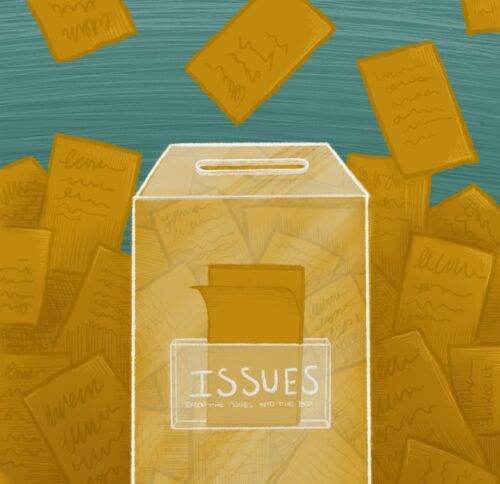Voters Concerned Over Country’s Economic Downfall, Election Integrity, and Lack of Resources

By Annette Mullaney
Collaborator to The Guardsman
Economic issues, including unemployment, expanding health care, and stimulus payments, dominate many voters’ concerns heading into the upcoming election, though there is also considerable worry about the election process itself.
“The economy is in a really bad place,” Professor of Broadcast Media at City College Andrea Medina said. She thinks the government needs to create job opportunities, implement rent control, and provide more stimulus.
To City College student Jess Nguyen, the pandemic has thrown inequality into sharp relief. “There’s people who have made billions and billions in this pandemic… Not everyone is paying their fair share in taxes and it does affect a lot of public schools and community services.”
Even City College’s own budget woes could be attributed to that underfunding, Nyugen said. “If we got $10 million extra funding, we wouldn’t have had those class cuts, we’d be able to pay teachers, and we would probably have a better response to the CO-VID pandemic.”
Vice-President of John Adams campus Angelica Nevarez said that City College’s budget crisis and cuts to classes spurred her to join the student government. She wants elected officials who will be transparent and realistic with their solutions, and support students. “Whether it’s laptops, hotspots, or providing additional resources like how to sign up for CalFresh – all of that matters to give families and students an opportunity to breath a little.”
CalFresh known federally as the Supplemental Nutrition Assistance Program (SNAP) is the largest food program in CA, and provides monthly food and economic benefits to low-income families. The program is federally mandated in CA, and is county operated and state supervised.
Writer and Adjunct Instructor at City College Lisa Rosenberg has a litany of issues she cares about – expanding education, universal health care, addressing racial disparities, and criminal justice reform – though she sees them as part of an overarching theme of prioritizing human potential. “Society can either be one in which people are constantly having their abilities, wishes, and dreams stopped down, or one you really invest in people.”
Research Associate in biotech Oyang Teng, 37, said he cares about living in a city with accessible and well-funded public services. For example, he said he tends to reflexively support public transportation measures. “If democracy means anything, it means letting people get to where they need to go whether they have a lot of money or not.”
To City College student Kieran Briden, 22, “housing is a huge issue, and is probably going to stay a huge issue, so anything to get more affordable housing and less homelessness.”
Process is policy to some voters; there’s widespread concern that these elections will not accurately represent the will of the electorate. Rosenberg said she was worried about cheating, “There’s so much weirdness – take these fake ballot boxes” she said.
City College student Mike Davis, listed balloting issues, voter suppression, hacking, and gerrymandering as reasons to worry about corruption and meddling. “The people that are in office right now would absolutely do shady s— if they can get away with it.”
Software engineer Caleb Astey said he hopes campaign finance reform, Washington D.C. and Puerto Rican statehood, reforming the House of Representatives, and the electoral college are priorities after the election. Electoral reform, he said, is necessary to “rebalance the conversation and allow for representation of the people. Then we can have a discussion about policy.”
The politicians who get reelected or get elected to offices after the election will have many challenges ahead of them, as the average citizen has become more active in policy-making and in understanding their community’s needs.
